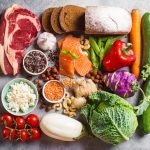Psoriasis is a chronic skin condition that affects around 7.5 million Americans. It can cause pain, discomfort, and embarrassment due to the inflammation and dryness of the skin. While there is no known cure for psoriasis, certain foods can help alleviate the symptoms, while others can make them worse.
In this article, we will discuss the best and worst foods for psoriasis. By avoiding trigger foods and incorporating more anti-inflammatory foods into your diet, you may be able to keep your psoriasis symptoms under control.
Worst Foods for Psoriasis
Processed Meats
Processed meats, such as bacon, ham, sausages, hot dogs, and jerky, are high in sodium and saturated fats, which can trigger flare-ups and worsen psoriasis symptoms. These meats are preserved using smoking, curing, salting, or chemical preservatives, which can cause inflammation and skin dryness. If you have psoriasis, it’s best to choose leaner cuts of meat and limit your portion size.
Refined Sugar
Foods high in refined sugar, such as candy, cookies, cakes, and other desserts, can worsen psoriasis symptoms. These foods trigger inflammation and cause the body to produce more skin cells, leading to flare-ups. Refined sugar is also an ingredient in processed foods high in saturated fats and simple carbohydrates, which can contribute to inflammation. If you have psoriasis, avoid or limit foods high in refined sugar.
Nightshade Vegetables
Nightshade vegetables, such as potatoes, peppers, and eggplants, contain solanine, a chemical that can be toxic to people with psoriasis in large amounts. These vegetables can lead to flare-ups and severe inflammation. While nightshades are generally safe to eat in moderation, some people with psoriasis may find that they flare up when they eat them. If you suspect nightshade vegetables may be triggering your flares, talk to your doctor or a registered dietitian to see if eliminating them from your diet could help.
Alcohol
Drinking too much alcohol can worsen psoriasis symptoms and cause other health problems. While alcohol may help to reduce inflammation and improve symptoms in small amounts, people with psoriasis should avoid drinking large amounts of alcohol or binge drinking. If you drink, it’s crucial to stay hydrated by drinking plenty of water. You should also avoid alcoholic drinks that are high in sugar or contain triggers for psoriasis flare-ups.
Dairy
A recent study by researchers at the University of Pennsylvania found that people who ate the most dairy had frequent flare-ups. Dairy products contain inflammatory fatty acids, which can worsen psoriasis symptoms. Avoiding dairy is a simple dietary change that may help some patients control their symptoms.
Best Foods for Psoriasis
Fatty Fish
Fatty fish, such as salmon, mackerel, herring, and sardines, are effective foods for reducing inflammation. These fishes are packed with omega-3 fatty acids, which are beneficial for inflammatory conditions like psoriasis. Salmon and tuna are two of the best fishes you can eat for psoriasis. Salmon is packed with omega-3 fatty acids, which have anti-inflammatory properties that can help reduce the symptoms of psoriasis. Tuna is also a good source of omega-3s and lean protein that help keep your skin healthy.
Low-fat Dairy
Low-fat dairy is an excellent option for people with psoriasis. Research has shown that a low-fat diet can help reduce psoriasis flare-ups, and dairy is a trigger food for many people with the condition. Switching to low-fat dairy can help prevent symptoms and reduce inflammation, which can trigger psoriasis flare-ups.
Fatty acids in low-fat dairy have anti-inflammatory properties, reducing psoriasis flare-ups. Additionally, this dairy contains calcium, a nutrient that may help reduce skin cell turnover, a key factor in psoriasis development. To reduce the symptoms of psoriasis, consider adding more low-fat dairy to your diet. However, it’s essential to talk to your doctor or a registered dietitian first, as they can help create a healthy and balanced meal plan that meets your individual needs.
Legumes
Legumes, such as beans, lentils, and peanuts, are rich in fiber and protein and can help reduce inflammation. A study found that people who ate the most legumes had a 24 percent lower risk of developing psoriasis. Therefore, incorporating legumes into your diet may be helpful in managing the condition.
However, it’s essential to avoid canned legumes, which are often high in sodium. If you have psoriasis, talk to your doctor or a registered dietitian about whether adding legumes to your diet might be helpful for you.
Whole Grains
Whole grains are essential for a healthy diet and may be especially beneficial for people with psoriasis. They are a good source of fiber and other nutrients that can reduce inflammation and keep the skin healthy. Some of the best options for people with psoriasis include oats, brown rice, and quinoa. For example, oats have been shown to help reduce itching and inflammation better than other grains.
You can incorporate these grains into various recipes or consume them as a main dish. People with psoriasis should eat at least two servings of whole grains weekly to provide numerous benefits, including improved skin health.
Fruits and Vegetables
Certain fruits and vegetables are excellent for people with psoriasis. They are rich in vitamins, minerals, and antioxidants that help reduce inflammation. Some good options include leafy greens, oranges, berries, and cherries.
Leafy green vegetables such as spinach and kale are packed with nutrients beneficial for people with psoriasis. These greens are high in vitamins A, C, and E, which can help reduce inflammation and skin irritation. A diet rich in fruits like oranges, berries, and cherries is perfect for psoriasis because they feature vitamin C. Vitamin C is an essential nutrient for skin health as it boosts immunity, and these fruits are all excellent sources of it.
Eating a variety of colorful fruits and vegetables is always a good idea for overall health, but if you have psoriasis, these foods can be particularly beneficial.
The Best Foods for Psoriasis
The best foods for psoriasis are those high in antioxidants, such as fatty fish, lean protein, legumes, fruits, and vegetables. Antioxidants help reduce inflammation and can prevent psoriasis flare-ups. Incorporating these foods into your diet can also improve skin health and reduce the risk of developing psoriasis.
The Worst Foods for Psoriasis
The worst foods for psoriasis are those high in sugar and refined carbs, which can trigger inflammation. People with psoriasis should avoid processed foods, sugary drinks, and foods high in saturated and trans fats.
Conclusion:
Incorporating healthy foods into your diet can have a significant impact on managing psoriasis symptoms. A diet rich in fruits, vegetables, legumes, whole grains, and low-fat dairy can help reduce inflammation and skin irritation, which are key factors in psoriasis development.
By avoiding trigger foods high in sugar and refined carbs, people with psoriasis can improve their overall health and well-being. It’s essential to consult with a doctor or registered dietitian before making any significant dietary changes to ensure that your meal plan meets your individual needs.
Overall, a healthy and balanced diet, coupled with other lifestyle changes, such as regular exercise and stress management, can help reduce the frequency and severity of psoriasis flare-ups. By prioritizing your health and well-being, you can take control of your psoriasis and improve your quality of life.








